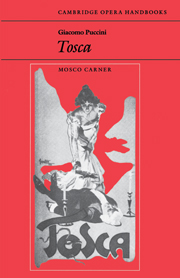Book contents
- Frontmatter
- General preface
- Contents
- List of illustrations
- 1 Sardou and his La Tosca
- 2 Naturalism in opera: verismo
- 3 Genesis of Tosca
- 4 Synopsis
- 5 Play and opera: a comparison
- 6 First production and critical history
- 7 Interpretation: some reflections
- 8 Style and technique
- 9 Musical and dramatic structure
- 10 Analysis: Act I in perspective
- 11 Tosca in the United States
- Notes
- Select bibliography
- Discography by Malcolm Walker
- Index
- Frontmatter
- General preface
- Contents
- List of illustrations
- 1 Sardou and his La Tosca
- 2 Naturalism in opera: verismo
- 3 Genesis of Tosca
- 4 Synopsis
- 5 Play and opera: a comparison
- 6 First production and critical history
- 7 Interpretation: some reflections
- 8 Style and technique
- 9 Musical and dramatic structure
- 10 Analysis: Act I in perspective
- 11 Tosca in the United States
- Notes
- Select bibliography
- Discography by Malcolm Walker
- Index
Summary
It was Ferdinando Fontana, the librettist of Puccini's two early operas Le Villi (1884) and Edgar (1889), who first suggested Sardou's play to Puccini as an operatic subject. This was in early spring 1889, a few months after the first (La Scala) production of Edgar. The composer, who acquainted himself with the play through Fontana, was greatly impressed by it, and wrote to his publisher, Giulio Ricordi, on 7 May 1889:
I think of Tosca. I beg you to take the necessary steps in order to obtain Sardou's permission. If I had to abandon this idea it would sadden me in the extreme. For I see in this Tosca the opera that exactly suits me – an opera without excessive proportions, one not conceived as a decorative spectacle and not requiring the usual superabundance of music.
(Fontana was much piqued when seven years later, after Puccini had decided on Tosca, Ricordi called in Giacosa for the versification of the libretto, a task which, as the first to have thought of the French play, he had been hoping for himself and about which he had corresponded with Sardou.)
It seems likely that, because Puccini was at the time a composer without name or mark outside Italy, Sardou at first refused permission for the musicalization of his play. Also, in spite of his evident enthusiasm for the subject Puccini, then sailing in the deep waters of romanticism (Manon Lescaut) and later attempting a mixture of romantic and realist elements (La Bohème), began to have qualms about a subject of such realistic violence and brutality.
- Type
- Chapter
- Information
- Giacomo Puccini: Tosca , pp. 11 - 21Publisher: Cambridge University PressPrint publication year: 1985



